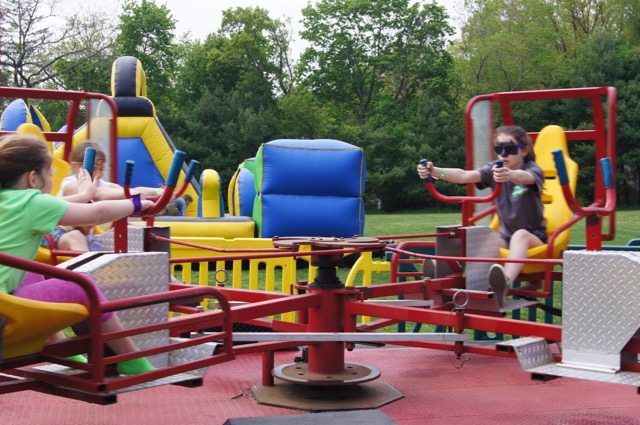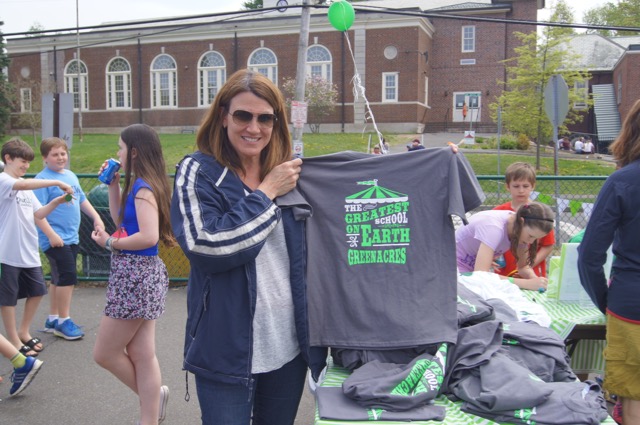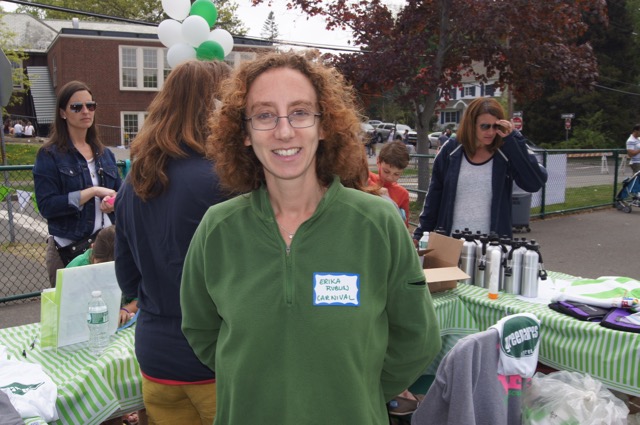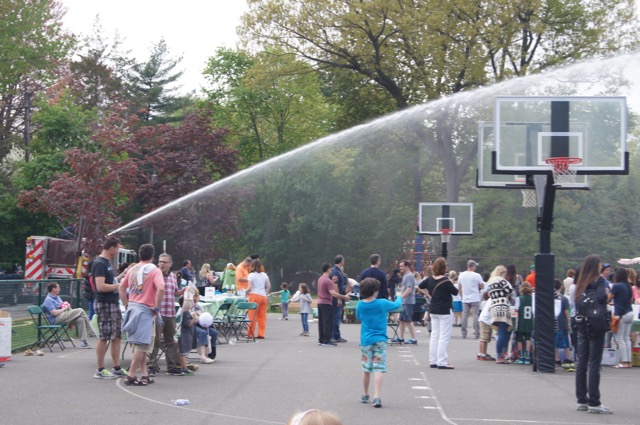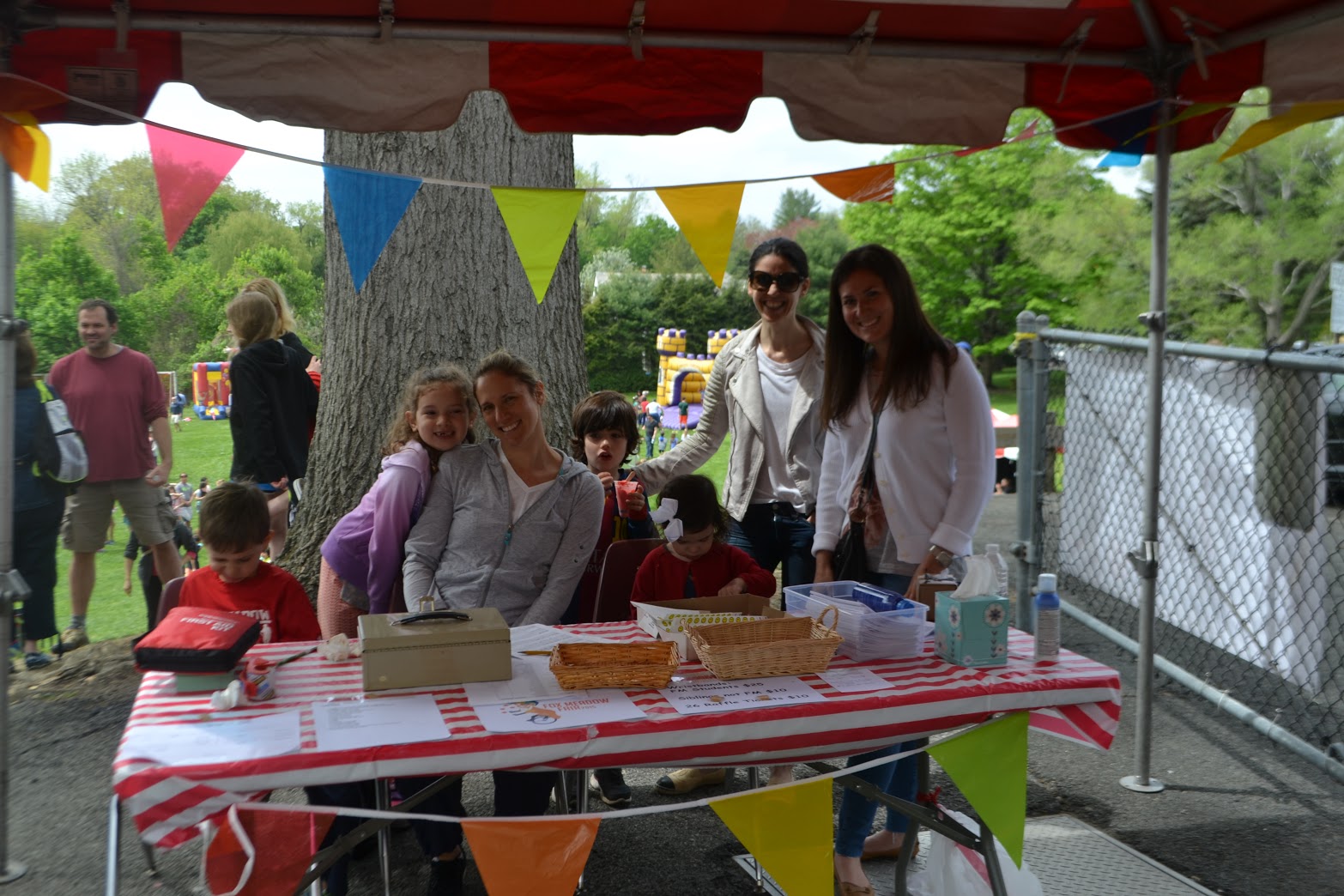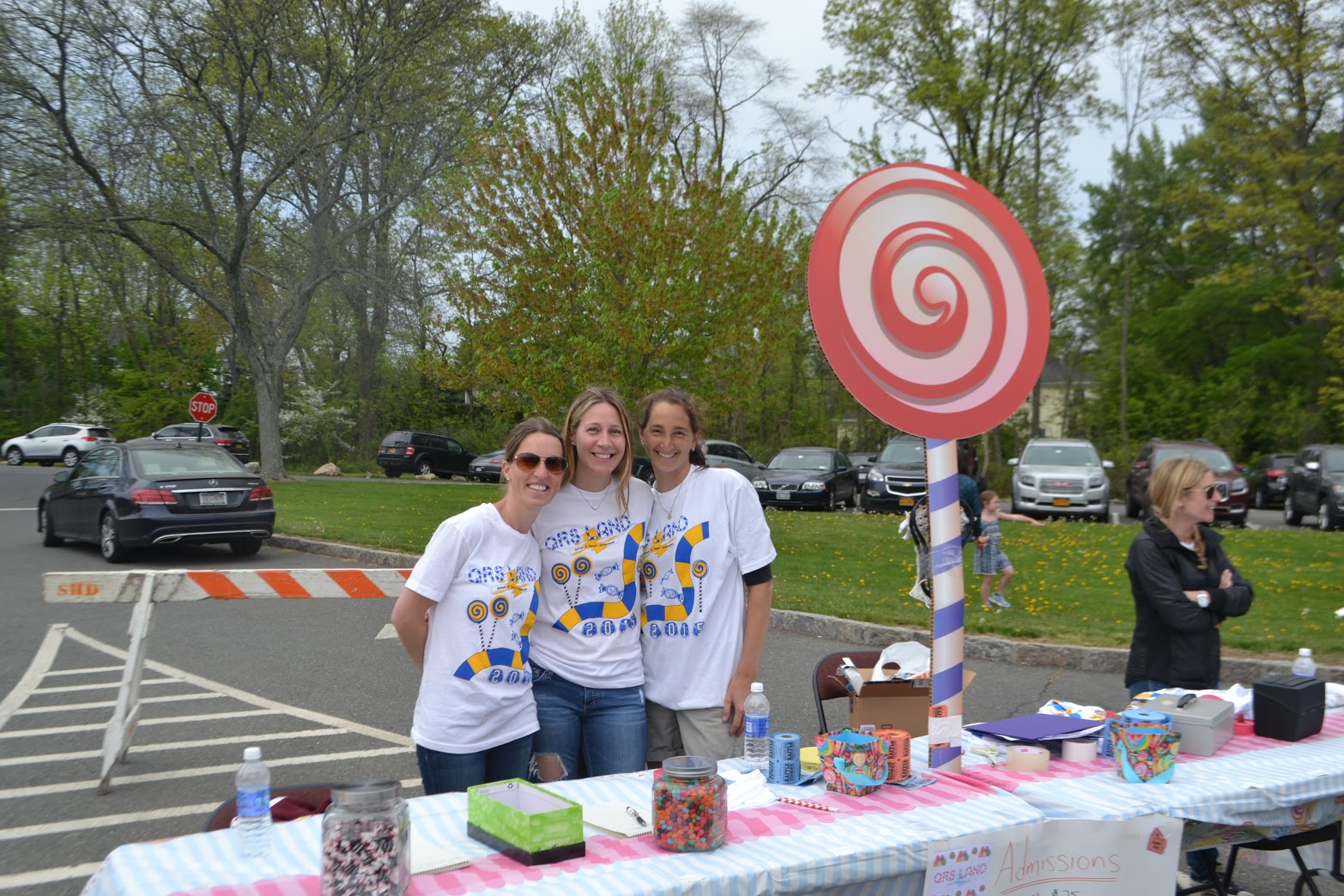Greenacres Elementary PTA President Taking it to New Heights
- Details
- Written by: Midori Im
- Hits: 3765
 PTA President Isabel Finegold didn't realize that she could get so carried away in her position of leadership. Though not a great fan of heights, she agreed to be transported on May 29th for an aerial shot of the Greenacres students and staff as they lined up to form a "100" in commemoration of the hundredth anniversary of the Greenacres school, the oldest public school in the district. With the support (literally) of the Scarsdale Fire Department, Mrs. Finegold was transported about 70 feet in the air to take the photograph. Though she has spent several years at the school, both as a student and then as a parent, this bird's-eye view certainly gave her a new perspective on the school. This is one of several special events Greenacres will hold in 2015 to commemorate the school's centennial, culminating in a huge celebration with current parents, alumni, and members of the Greenacres community on the evening of November 20, 2015.
PTA President Isabel Finegold didn't realize that she could get so carried away in her position of leadership. Though not a great fan of heights, she agreed to be transported on May 29th for an aerial shot of the Greenacres students and staff as they lined up to form a "100" in commemoration of the hundredth anniversary of the Greenacres school, the oldest public school in the district. With the support (literally) of the Scarsdale Fire Department, Mrs. Finegold was transported about 70 feet in the air to take the photograph. Though she has spent several years at the school, both as a student and then as a parent, this bird's-eye view certainly gave her a new perspective on the school. This is one of several special events Greenacres will hold in 2015 to commemorate the school's centennial, culminating in a huge celebration with current parents, alumni, and members of the Greenacres community on the evening of November 20, 2015.
Photos courtesy of Isabel Finegold and Sharon Higgins.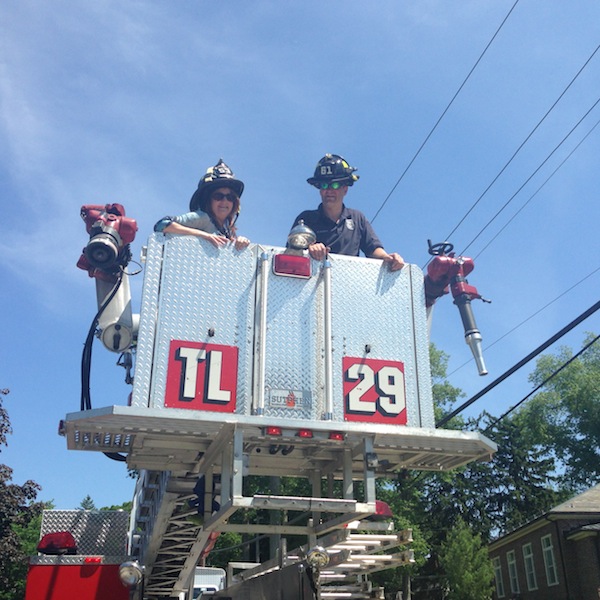
The Heathcote School: Progressive Design for Now and Then
- Details
- Written by: Joanne Wallenstein
- Hits: 18066
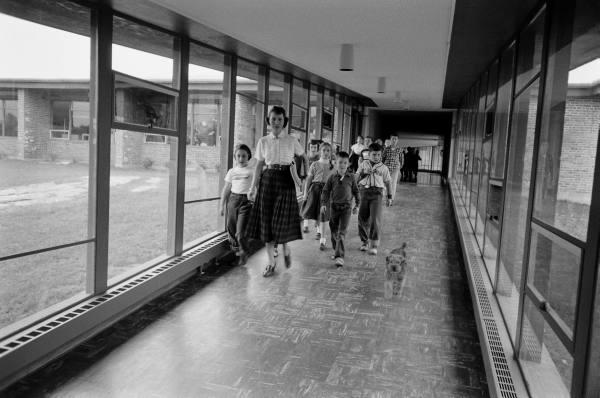 In the days before mid-century architecture became retro, it was considered modern. And when it was built in 1954, the Heathcote School in Scarsdale set the standard for modern school design. Last week, a busload of architects from the firm Perkins + Will, who designed the original school, came to tour this landmark.
In the days before mid-century architecture became retro, it was considered modern. And when it was built in 1954, the Heathcote School in Scarsdale set the standard for modern school design. Last week, a busload of architects from the firm Perkins + Will, who designed the original school, came to tour this landmark.
Designed by Lawrence B. Perkins, the progressive layout included four pods or clusters, rather than perpendicular hallways lined with classrooms. Each pod included classrooms and a central meeting space that could be used for flexible learning. The exterior walls of the school were made with glass rather than brick to bring the outside inside.
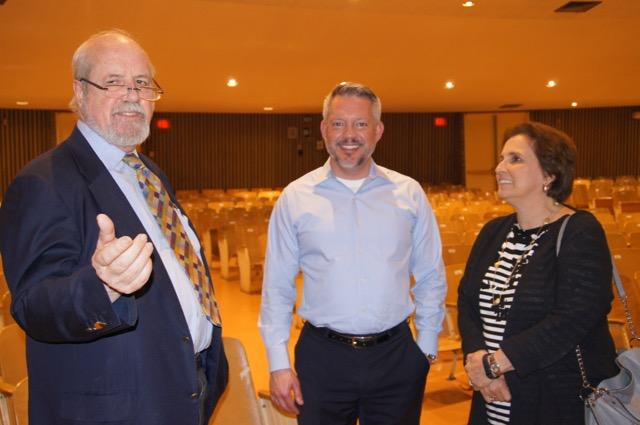 Brad Perkins, a Scarsdale resident who is the son of the architect and an architect himself, greeted the visitors and explained that the Heathcote School was the second innovative school that his father designed. The first was Crow Island, in Winnetka Illinois, another landmark school that coincidentally is the previous home of Scarsdale's new superintendent, Thomas Hagerman.
Brad Perkins, a Scarsdale resident who is the son of the architect and an architect himself, greeted the visitors and explained that the Heathcote School was the second innovative school that his father designed. The first was Crow Island, in Winnetka Illinois, another landmark school that coincidentally is the previous home of Scarsdale's new superintendent, Thomas Hagerman.
Built in 1941, Crow Island shares many features with Heathcote. 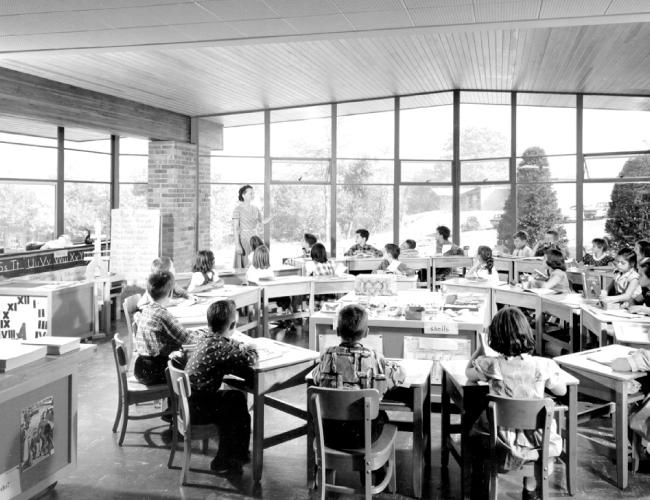 It too was designed by Lawrence B. Perkins – who worked with famed architect Eero Saarinen. Classrooms were grouped in three separate wings according to age and connected by a core of rooms for common use: the auditorium, library, gym, activities room, administration, and so forth. The grounds and play area extending from the classroom wings were also zoned according to age groups to allow for increased freedom and greater safety in play activities. The school won the American Institute of Architects' 25-Year Award, an award that had been given only once before, to the Rockefeller Center in New York City.
It too was designed by Lawrence B. Perkins – who worked with famed architect Eero Saarinen. Classrooms were grouped in three separate wings according to age and connected by a core of rooms for common use: the auditorium, library, gym, activities room, administration, and so forth. The grounds and play area extending from the classroom wings were also zoned according to age groups to allow for increased freedom and greater safety in play activities. The school won the American Institute of Architects' 25-Year Award, an award that had been given only once before, to the Rockefeller Center in New York City.
We had the pleasure of touring the Heathcote School with the architects, and here is what we learned from Joan Blumenfeld of Perkins + Will. The design of the Heathcote School was a departure from traditional school plans. Some of the design elements that were unique and forward-thinking at the time include:
- Classrooms in pods, or clusters, to create smaller subgroups within the school, thus encouraging a greater sense of community for young children.
- Central space in between classrooms that can be used for alternative learning spaces, or for group activities.
- Flexible layouts in the classrooms, allowing the teachers to arrange the furniture differently for different learning activities
- There are no traditional desks facing in a row facing the teacher, for teachers to teach down to the students. The plans encourage interactive learning, allowing for many different kinds of learning activities during the day.
- The idea that learning occurs outside the classroom as well as inside, encouraging physical activity and the engagement with the outdoors. The large windows on all sides of the classrooms, the glass corridors, all make the outside inside relationship stronger.
- Single loading all the corridors, or having them have glass on both sides, allows natural light into them along with views to the outside. There has been lots of research linking better learning outcomes when students have access to daylight and views.
- Using the idea of creating a comfortable environment, such as having a fireplace and little "living room" in the library, so that children can learn in an informal atmosphere.
- Centralizing the shared spaces, such as the auditorium and administration areas, so that they are equidistant from the classrooms. This also allows the classrooms to be at "dead ends" so that there is less traffic in the corridors.
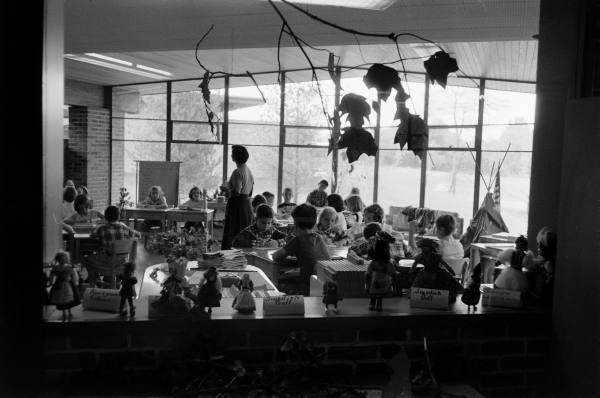 All of these features are emulated in school design today.
All of these features are emulated in school design today.
Some of the features of the school did not stand the test of time. The classrooms were designed for small groups, and there was less "stuff" in them when they were designed, so that they are now a bit cramped, and have inadequate storage space. The lighting and ventilation has been upgraded and the windows have been replaced with more energy efficient models. Technology has been added on, as there was little or none when the school was designed, but as a result it is not well integrated.
We wondered why the school has no cafeteria and were told that at the time Heathcote was built, there was no need for a cafeteria as mothers did not work and children went home for lunch.
Some Scarsdale residents might ask about the relationship between Perkins +Will, the firm that designed the Heathcote School and Perkins Eastman, the firm that designed the new commercial building at the Heathcote Five Corners. Perkins+Will was headed by Larry Perkins and Phil Will when they designed Heathcote School, built in 1953. By the 1980's they had retired and were succeeded by a number of other partners, among them Larry Perkins' son, Brad Perkins. Brad Perkins, along with Mary Jane Eastman, split off from Perkins+Will to form their own firm, eventually named Perkins Eastman, in 1981. The building on Palmer Avenue is by Brad Perkins, along with a local partner.
Carnival Fun at Scarsdale Elementary Schools
- Details
- Written by: Joanne Wallenstein
- Hits: 9818
 A combination of creative parents, enthusiastic kids and sun from Mother Nature made this year's carnivals at all five elementary schools a success in Scarsdale. Here are photos and a recap from each one.
A combination of creative parents, enthusiastic kids and sun from Mother Nature made this year's carnivals at all five elementary schools a success in Scarsdale. Here are photos and a recap from each one.
Edgewood: This year Sheila Shigekawa and Becka Kinoshita co-chaired the Edgewood Elementary Fair on Saturday May 9. As they are both from Hawaii, they had an Edgewood Luau theme! The chairs report that it was a great community day filled with Hawaiian themed fun. The kids seemed to enjoy it all. In addition to traditional carnival games and rides, our Luau offered an authentic Polynesian Show (with dancers from Hawaii), tropical orchids for sale in our Plants Booth, a Tiki Rock Wall climbing ride, a Hawaiian Shave Ice truck, Candy Leis made in a craft booth, and a Beach Boutique offering handicrafts (jewelry, notecards, etc..) all made by Hawaiian artists. The Luau ended with the auction of a custom airbrushed skateboard  generously donated by well-known Hawaiian artist and professional surfer, Jeannie Chesser. It was a wonderful "visit" to Hawaii, all without having to leave Scarsdale.
generously donated by well-known Hawaiian artist and professional surfer, Jeannie Chesser. It was a wonderful "visit" to Hawaii, all without having to leave Scarsdale.
Greenacres: The Circus was in town. Greenacres students and their families experienced magic under the big top when they gathered Saturday for the annual school carnival. This year's carnival had a circus theme, and there were circus performers, live animals, fun rides, crafts, and opportunities for students to learn tricks of the circus trade.. Of course, no circus would be complete without the mandatory popcorn and cotton candy. Said one Greenacres alum, now a high school freshman, "This is so much better than when we were at Greenacres!" The event was co-chaired by Erika Rublin and Betsy Crouch.
Fox Meadow: Carnival co-chairs Wendy MacMillan, Veronica Olivieri and Regina Han Jansky were decked out in circus theme outfits by the Japanese moms. The children loved the circus performers, euro bungee, bumper cars, karaoke machine and visit with the Fox.
Circus workshops and shows ran through out the day. Children also enjoyed making unique crafts sponsored by the Multicultural committee. There was great attendance with several hundred people attending the fair over the 4-hour time span. Many younger siblings and some alumni as well all enjoying the arcade games, euro bungee, bumper cars, circus shows and workshops and, of course the 5th Grade dunk tank.
Lange's Deli manned the barbeque and everyone enjoyed the food and desserts sold by the fifth graders. The Fox Meadow fox made an appearance for photos and many children posed with the decorated foxes.

 Quaker Ridge: Carnival co-chairs Stephanie Klingsberg, Keely Mann and Erin Bass report that a sweet time was had by all at the Quaker Ridge School Candy Land themed carnival! Over 400 kids enjoyed the bounce houses, rides, face painting, arts and crafts, cake walk, photo booth, Coach Steve, candy themed games, the 5th grade dunk tank, amazing raffle prizes donated by local stores, cotton candy, sno-cones, and so much more. The PTA thanks carnival sponsors Platinum Drive Realty, Pepsico, Sharon's Sorbet, Houlihan Lawrence, Standing Room Only, and Amore Pizza and the entire Quaker Ridge School community for making this event such a great success.
Quaker Ridge: Carnival co-chairs Stephanie Klingsberg, Keely Mann and Erin Bass report that a sweet time was had by all at the Quaker Ridge School Candy Land themed carnival! Over 400 kids enjoyed the bounce houses, rides, face painting, arts and crafts, cake walk, photo booth, Coach Steve, candy themed games, the 5th grade dunk tank, amazing raffle prizes donated by local stores, cotton candy, sno-cones, and so much more. The PTA thanks carnival sponsors Platinum Drive Realty, Pepsico, Sharon's Sorbet, Houlihan Lawrence, Standing Room Only, and Amore Pizza and the entire Quaker Ridge School community for making this event such a great success.
Community Volunteers to Plant 300 Trees and Shrubs in Scarsdale
- Details
- Written by: Joanne Wallenstein
- Hits: 7929
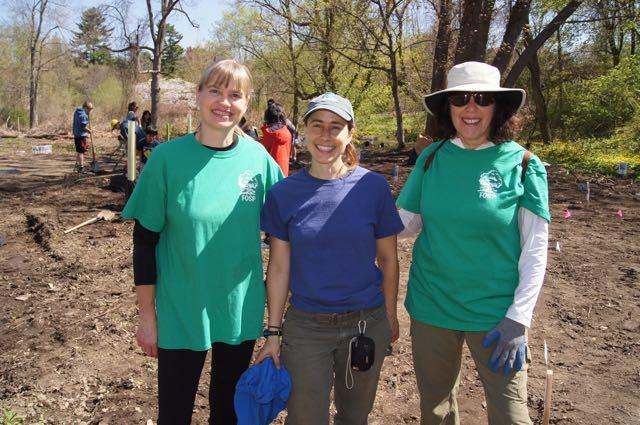 132 volunteers of all ages turned out on Saturday to plant trees and shrubs along Brewster Road to help protect Scarsdale's green infrastructure. The Village was fortunate to receive 300 one-two quart trees and shrubs from the NYS Department of Environmental Conservation. All were native species that were slated to replace invasive plants such as mugwort, knotweed and loose strife that had taken over the area lining the waterway between the northern end of the Scarsdale High School parking lot and library pond. The donated plants included red oaks, red maples, river birch and 200 shrubs which will grow quickly.
132 volunteers of all ages turned out on Saturday to plant trees and shrubs along Brewster Road to help protect Scarsdale's green infrastructure. The Village was fortunate to receive 300 one-two quart trees and shrubs from the NYS Department of Environmental Conservation. All were native species that were slated to replace invasive plants such as mugwort, knotweed and loose strife that had taken over the area lining the waterway between the northern end of the Scarsdale High School parking lot and library pond. The donated plants included red oaks, red maples, river birch and 200 shrubs which will grow quickly.
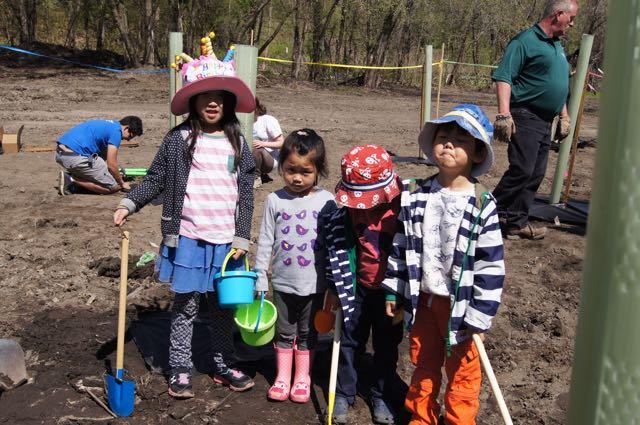 Volunteers arrived wearing gardening gloves and waterproof shoes and carrying shovels, ready to plant. Hosted by The Friends of the Scarsdale Parks and Scarsdale Village, the Community Planting day brought out representatives from neighborhood associations, girl and boy scout troops, the Conservation Advisory Counsel and even the Mayor who all showed up to plant a tree.
Volunteers arrived wearing gardening gloves and waterproof shoes and carrying shovels, ready to plant. Hosted by The Friends of the Scarsdale Parks and Scarsdale Village, the Community Planting day brought out representatives from neighborhood associations, girl and boy scout troops, the Conservation Advisory Counsel and even the Mayor who all showed up to plant a tree.
Beth Roessler from the NYS Department of Environmental Conservation said that her department donates trees to seven watershed areas around the state, and recently ran a similar program in the Bronx. The "Trees for Tribs" program provides trees and shrubs for Riparian (streamside) buffers to maintaining healthy streams and waters.
Madelaine Eppenstein, a Co-President of the Scarsdale Friends of the Parks said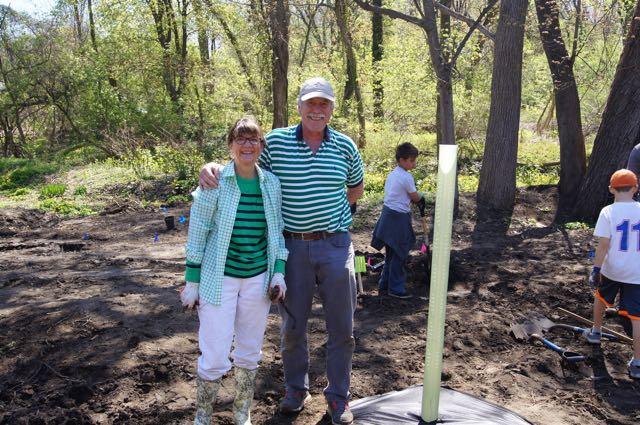 , "The Friends of the Scarsdale Park's Wetland Restoration Project and the NYS DEC Trees for Tribs program have the potential to restore the Harwood Park forested wetland and to save one of the last open green spaces in the village for the use and enjoyment of all Scarsdalians. The May 2 Community Planting Day co-sponsored by the Department of Parks, Recreation and Conservation and FOSP represents a conservation turning point for the Fox Meadow Brook stream and its ecosystems. FOSP expresses our gratitude to the over 100 volunteers who worked very hard to complete the planting of almost 300 native trees and shrubs in only one day. They can be proud of their participation in a first of its kind community team endeavor – and for taking part in a landmark environmental project to create a nature preserve in one of the oldest named parks in the village."
, "The Friends of the Scarsdale Park's Wetland Restoration Project and the NYS DEC Trees for Tribs program have the potential to restore the Harwood Park forested wetland and to save one of the last open green spaces in the village for the use and enjoyment of all Scarsdalians. The May 2 Community Planting Day co-sponsored by the Department of Parks, Recreation and Conservation and FOSP represents a conservation turning point for the Fox Meadow Brook stream and its ecosystems. FOSP expresses our gratitude to the over 100 volunteers who worked very hard to complete the planting of almost 300 native trees and shrubs in only one day. They can be proud of their participation in a first of its kind community team endeavor – and for taking part in a landmark environmental project to create a nature preserve in one of the oldest named parks in the village."
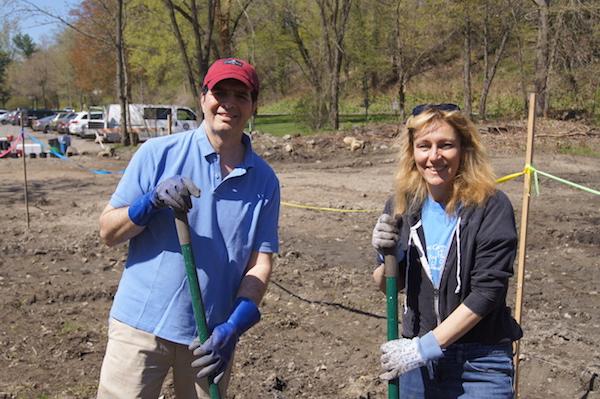
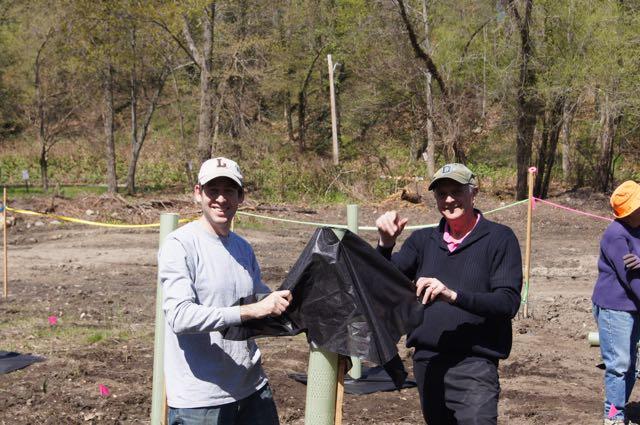
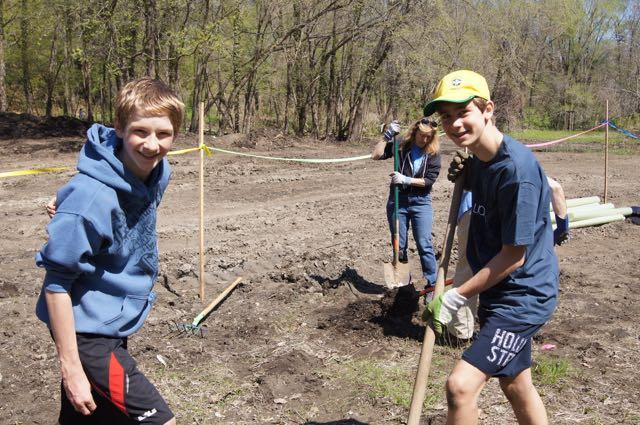
Serve for Scholarships and Youth Tennis League
- Details
- Written by: Joanne Wallenstein
- Hits: 4206
 The first-ever “Serve for Scholarships” Tennis Tournament brought out 42 players on a cold and windy Saturday morning to hit some balls and raise money for the Scarsdale PTA Scholarship Fund. The event was the brainchild of SHS PTA President Amy Cooper, who partnered with Tammy Fine, to combine their two passions – helping the community and a love of tennis.
The first-ever “Serve for Scholarships” Tennis Tournament brought out 42 players on a cold and windy Saturday morning to hit some balls and raise money for the Scarsdale PTA Scholarship Fund. The event was the brainchild of SHS PTA President Amy Cooper, who partnered with Tammy Fine, to combine their two passions – helping the community and a love of tennis.
The Scarsdale Village Recreation Department helped to get the event off the ground by giving Cooper and Fine a permit for use of the Scarsdale Middle School courts. Community businesses were also generous: Sportime donated the tennis balls, ProFrom offered a free 60-minute tennis lesson, Lifetime gave guest passes and Fleetwood Lock and Karen Kohn Jewelry were sponsors. Every participant walked away with Sugarpova candy, donated by the company.
There were 15 raffle prizes, or tennis survival kits that included balls, grips, water bottles, chocolates, tiger balm 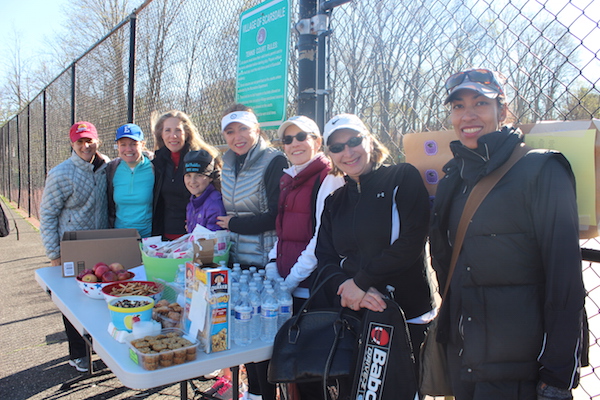 and K-Tape.
and K-Tape.
Teams were organized by elementary school and many of the women wore their kids school shirts underneath their down jackets. Fox Meadow was the winner followed by Quaker Ridge, Heathcote and Greenacres.
Pamela Feuhrer said the following: "As the Fundraising Vice Chair for the Scholarship Fund, I want to pass on my deepest thanks to Tammy and Amy. Has any other fundraising chair had such an amazing event be created and implemented without having to lift a finger? I think not. Tremendous effort and much appreciated!!! Thanks to each participant and to those who donated but didn't play (not sure they're in this email group). Your involvement raised an additional $1,375 (and counting?) that our committee can grant to graduating seniors in need. Visit our webpage for more info! Racquets up and hats off to Amy and Tammy!"
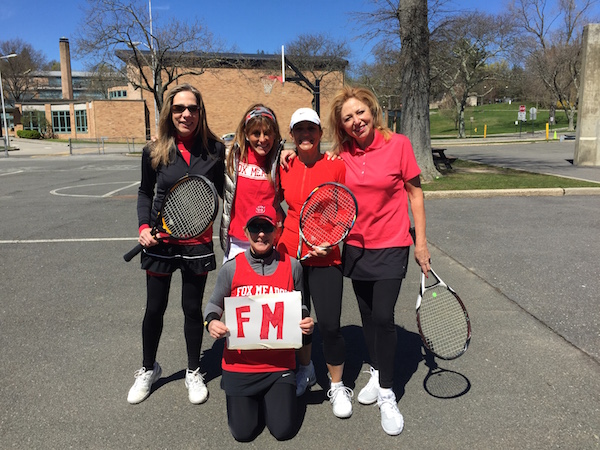 Cooper said she would like to make this an annual event and encouraged residents to visit the scholarship fund website to make donations to the scholarship fund or to find information about applying for a scholarship. Scholarships are awarded to graduating Scarsdale high school seniors, on a need-based review, to help defray the cost of the first year of college.
Cooper said she would like to make this an annual event and encouraged residents to visit the scholarship fund website to make donations to the scholarship fund or to find information about applying for a scholarship. Scholarships are awarded to graduating Scarsdale high school seniors, on a need-based review, to help defray the cost of the first year of college.
Youth Tennis League Begins This Week:
The Scarsdale Spring Youth Tennis League for Grades 3 through 8 for boys and girls starts on Monday, April 27 at 4:45 PM at the Scarsdale Middle School Tennis Courts . Register at www.scarsdale.com/recreation under Youth Tennis League or come to the Scarsdale Middle School Tennis Courts on Monday and Thursday from 4:45 PM to 6:45 PM and Friday from 6 PM to 7 PM to register and play.
The Youth League needs volunteer tennis coaches- Moms and Dads from the five elementary schools. Women who play for the Women’s County Leagues are encouraged to help organize the Youth Tennis Teams.
The Spring Youth Tennis League was started in 1984 by Bob Harrison and five elementary school area tennis chairs with 39 teams and 240 youth players. The League grew to 85 teams and 650 players in the 1990's with 100+ volunteer organizers. Sadly the League fell apart in the early 2000's with the lack of leadership from the Rec Department. Now there is great leadership from Anthony Di Domenico and Jason Marra from the Rec Department and the program is on the upswing.
For more information or to register, contact Anthony DiDomenico at adidomenico@scarsdale.com or 722-1160 or Bob Harrison at proscars@aol.com or 914 646-4054 (cell)
Bob Harrison, Director
New York Junior Tennis League, Scarsdale Chapter
Scarsdale Summer Youth Tennis League , Founder 1984 to 2014










